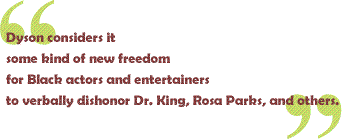

At the age of 71, I am a member of the progressive sector of African-American intellectuals, the post-World War II civil rights generation. The civil rights organizations I identified with were the NAACP, the National Council of Negro Women, the Congress of Racial Equality, the A. Philip Randolph Institute, the National Urban League, the Southern Christian Leadership Conference, and the Student Non-Violent Coordinating Committee, among others. The leadership personalities I looked up to and revered were W.E.B. Du Bois, James Weldon Johnson, Walter White, Roy Wilkins, Whitney Young, Mary McLeod Bethune, Dorothy Height, James Farmer, Martin Luther King Jr., Rosa Parks, Jesse Jackson, Julian Bond, John Lewis, Medgar Evers, and Fannie Lou Hamer, to mention only a few.
However, just recently several articles have appeared by members of the post-civil rights era generation of Black academics that amount to tossing poisoned darts at African Americans’ mainline civil rights tradition and its courageous leadership figures. One of these civil rights tradition-offending articles, penned by Michael Eric Dyson, a professor of Afro-American Studies at the University of Pennsylvania, appeared in the New York Times, September 27, 2002. In the op ed piece, Dyson claims he belongs to a new  generation of Black intellectuals who consider leadership personalities like Martin Luther King Jr. and Rosa Parks fair game for anyone’s comedic dishonoring. He defended such dishonoring of King and Parks in the Black people-offending MGM film, “Barbershop.”
generation of Black intellectuals who consider leadership personalities like Martin Luther King Jr. and Rosa Parks fair game for anyone’s comedic dishonoring. He defended such dishonoring of King and Parks in the Black people-offending MGM film, “Barbershop.”
Supporting the mindless hip-hop style irreverence toward African-American civil rights leadership, Prof. Dyson considers it some kind of new freedom for Black actors and entertainers to verbally dishonor Dr. King, Rosa Parks, and others. Dyson approaches the analytically bizarre in his article when he claims “that the barbershop…may be one of the last bastions of unregulated speech in black America.” He also claims that, “at the worst [civil rights organizations] are antidemocratic institutions headed by gifted but authoritarian leaders.”
These observations are not just bizarre, but outright falsehoods. They are analytically wrong and serve as anti-Black ammunition for conservative opponents of African-Americans’ civil rights agenda. The fact of the matter is that millions of everyday African-American citizens are fully aware of the unique, populist give-and-take interaction between leaders and followers that is typically experienced in branches of the National Council of Negro Women, the NAACP, the National Urban League, the National Bar Association, the African Methodist Episcopal Church convention, Black women’s sororities, etc. Extending forward from the Emancipation era in the late 19th century, the nooks and crannies of African-American life have been saturated with open speech, far more so than among other American groups. Open speech is precisely what, for example, Negro spirituals, gospel music, the “dozens,” dinner table-talk, street talk, meetings of all kinds of African-American organizations, have been about. Michael Dyson, an ordained Black clergyman, might do himself well to revisit the folk essence of African-American institutions, before he again contemplates an affront to Black people’s honor.
But Dyson’s article was a relatively mild version of the new Black leadership pretense among hip-hop spokespersons, when compared with another op ed article in the Boston Globe (October 2, 2002) titled “There’s No Bridging The Hip-Hop Gap,” by Todd Boyd, a professor of cinema/TV. Boyd’s grotesque slanders erupt like weeds from a thicket of historical ignorance, as he attempts to elevate hip-hop spokespersons to premier leadership status among African-Americans. Let me explain. MORE Here



No comments:
Post a Comment